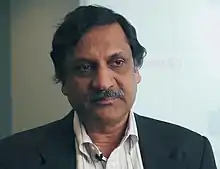Anant Agarwal
Anant Agarwal is an Indian computer architecture researcher.[1] He is a professor of Electrical Engineering and Computer Science at the Massachusetts Institute of Technology (MIT), where he led the development of Alewife, an early cache coherent multiprocessor, and also has served as director of the MIT Computer Science and Artificial Intelligence Laboratory. He is the founder and CTO of Tilera, a fabless semiconductor company focusing on scalable multicore embedded processor design.[2] He also serves as the CEO of edX, a joint partnership between MIT and Harvard University that offers free online learning.[3]
Anant Agarwal | |
|---|---|
 Agarwal in 2015 | |
| Born | June 8, 1959 |
| Occupation(s) | Professor, researcher |
| Known for | MOOC edX MITx |
| Honours | Padma Shri (2017) |
| Scientific career | |
| Fields | Computer architecture |
| Thesis | Analysis of Cache Performance for Operating Systems and Multiprogramming |
| Doctoral advisor | John L. Hennessy |
| Doctoral students | Frederic T. Chong |
| Website | people |
Education
Agarwal was born in Mangalore and did his schooling in St. Aloysius Mangalore. He holds a bachelor's degree (1982) in electrical engineering from Indian Institute of Technology Madras.[4] For postgraduate study, he attended Stanford University, where he received an MS (1984) and a PhD (1987), both in electrical engineering.[2][5][6][7] His PhD thesis, Analysis of Cache Performance for Operating Systems and Multiprogramming, was written under John L. Hennessy.[8]
Career
Agarwal is the CEO of edX, a worldwide, online learning initiative of MIT and Harvard. He is a leader of the Carbon Project, which is developing new scalable multicore architectures, a new operating system for multicore and clouds called fos, and a distributed, parallel simulator for multicore and clouds called Graphite. He is a leader of the Angstrom Project, which is creating fundamental technologies for exascale computing.[9] He contributes to WebSim, a web-based electronic circuits laboratory. He led the Raw Project at CSAIL, and is a founder of Tilera Corporation. Raw was an early tiled multicore processor with 16 cores. He also teaches the edX offering of MIT's 6.002 Circuits and Electronics.
In 2013, he was elected as a member into the National Academy of Engineering for contributions to shared-memory and multicore computer architectures.
His previous projects include Sparcle, a coarse-grain multithreaded (CGMT or switch-on-event SOE) microprocessor, Alewife, a scalable distributed shared memory multiprocessor, Virtual Wires, a scalable FPGA-based logic emulation system, LOUD, a beamforming microphone array, Oxygen, a pervasive human-centered computing project, and Fugu, a protected, multiuser multiprocessor.
Awards
Agarwal received the 2001 Maurice Wilkes Award for computer architecture.[10] In 2007 he was inducted as a Fellow of the Association for Computing Machinery.[11] In 2011 he was appointed Director of MIT's Computer Science and Artificial Intelligence Laboratory. In 2013, he became a member of the National Academy of Engineering and was appointed the CEO of EdX.[12] In March 2016, he was awarded the Harold W. McGraw, Jr. Prize in Education in higher education[13] as an outstanding leader of the development of the Massive Open Online Course movement. In addition to that, he is also a Distinguished Alumnus of IIT Madras.[14] He received Padma Shri, the fourth highest civilian award in the Republic of India in 2017.[15] In 2018, he received the Yidan Prize for Education Research, the world's largest education award, i.e. USD four million.[16]
Publications
- Anant Agarwal and Jeffrey Lang (2005). Foundations of Analog and Digital Electronic Circuits. Morgan Kaufmann. ISBN 1-55860-735-8.
References
- MIT directory
- "Board of Directors | Tilera Corporation". tilera.com. Archived from the original on 14 February 2012. Retrieved 27 February 2012.
- "edX – About edX". edxonline.org. Retrieved 7 May 2012.
- "Anant Agarwal". LinkedIn.
- Liu, Ariel (22 February 2016). "Q&A with Anant Agarwal, speaker at ignitED conference and CEO of edX". The Stanford Daily. Retrieved 26 October 2022.
- Agarwal, Anant. "Keynote II - Tiled Multicore Processors: The Four Stages of Reality". MICRO-40. MICRO. Retrieved 26 October 2022.
- "Keypanel Session". BARC 2006. Retrieved 26 October 2022.
- "Anant Agarwal". Mathematics Genealogy Project. Retrieved 26 October 2022.
- Smalley, Eric (23 January 2012). "MIT Genius Stuffs 100 Processors Into Single Chip". Wired. Retrieved 14 November 2018.
- The Maurice Wilkes Award. Archived 17 September 2008 at the Wayback Machine
- "About ACM Fellows".
- "Anant Agarwal's Home Page".
- "2016 Winners announced for The Harold W. McGraw, Jr. Prize in Education – McGraw Prize". www.mcgrawprize.com. Retrieved 15 March 2016.
- "Prof. Anant Agarwal of MIT is awarded the IITM Distinguished Alumnus Award". Indian Institute of Technology Madras, Department of Electrical Engineering. 10 February 2015. Retrieved 17 January 2019.
- "Padma Shri Awards: Meet the unsung heroes, Part II". 25 January 2017.
- "The official website of the Yidan Prize and Yidan Prize Foundation". Yidanprize.org. Retrieved 20 April 2023.